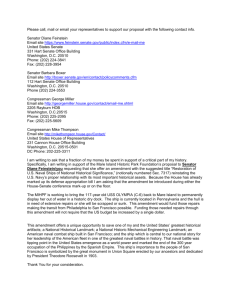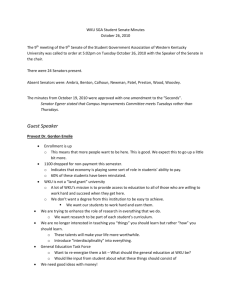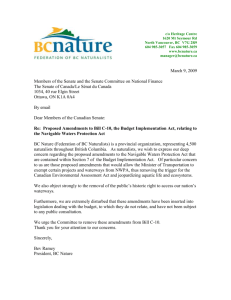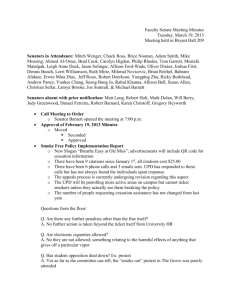CapitolColumbiaReport(5-21)
advertisement
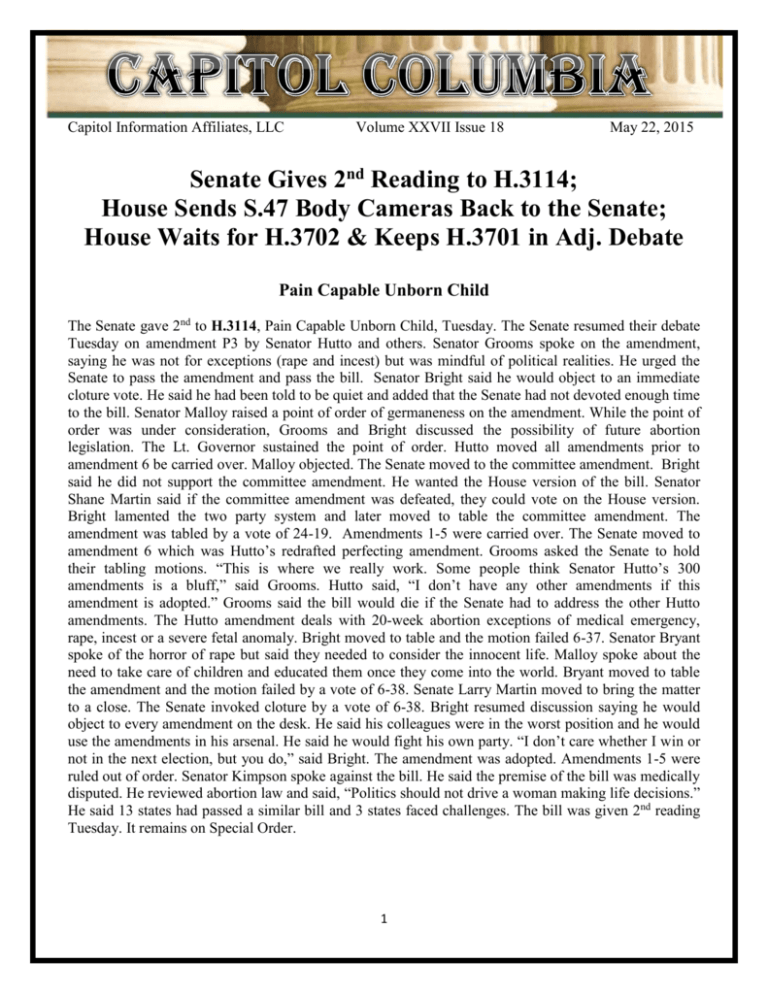
Capitol Information Affiliates, LLC Volume XXVII Issue 18 May 22, 2015 Senate Gives 2nd Reading to H.3114; House Sends S.47 Body Cameras Back to the Senate; House Waits for H.3702 & Keeps H.3701 in Adj. Debate Pain Capable Unborn Child The Senate gave 2nd to H.3114, Pain Capable Unborn Child, Tuesday. The Senate resumed their debate Tuesday on amendment P3 by Senator Hutto and others. Senator Grooms spoke on the amendment, saying he was not for exceptions (rape and incest) but was mindful of political realities. He urged the Senate to pass the amendment and pass the bill. Senator Bright said he would object to an immediate cloture vote. He said he had been told to be quiet and added that the Senate had not devoted enough time to the bill. Senator Malloy raised a point of order of germaneness on the amendment. While the point of order was under consideration, Grooms and Bright discussed the possibility of future abortion legislation. The Lt. Governor sustained the point of order. Hutto moved all amendments prior to amendment 6 be carried over. Malloy objected. The Senate moved to the committee amendment. Bright said he did not support the committee amendment. He wanted the House version of the bill. Senator Shane Martin said if the committee amendment was defeated, they could vote on the House version. Bright lamented the two party system and later moved to table the committee amendment. The amendment was tabled by a vote of 24-19. Amendments 1-5 were carried over. The Senate moved to amendment 6 which was Hutto’s redrafted perfecting amendment. Grooms asked the Senate to hold their tabling motions. “This is where we really work. Some people think Senator Hutto’s 300 amendments is a bluff,” said Grooms. Hutto said, “I don’t have any other amendments if this amendment is adopted.” Grooms said the bill would die if the Senate had to address the other Hutto amendments. The Hutto amendment deals with 20-week abortion exceptions of medical emergency, rape, incest or a severe fetal anomaly. Bright moved to table and the motion failed 6-37. Senator Bryant spoke of the horror of rape but said they needed to consider the innocent life. Malloy spoke about the need to take care of children and educated them once they come into the world. Bryant moved to table the amendment and the motion failed by a vote of 6-38. Senate Larry Martin moved to bring the matter to a close. The Senate invoked cloture by a vote of 6-38. Bright resumed discussion saying he would object to every amendment on the desk. He said his colleagues were in the worst position and he would use the amendments in his arsenal. He said he would fight his own party. “I don’t care whether I win or not in the next election, but you do,” said Bright. The amendment was adopted. Amendments 1-5 were ruled out of order. Senator Kimpson spoke against the bill. He said the premise of the bill was medically disputed. He reviewed abortion law and said, “Politics should not drive a woman making life decisions.” He said 13 states had passed a similar bill and 3 states faced challenges. The bill was given 2nd reading Tuesday. It remains on Special Order. 1 Port Enhancement Zones The Senate Medical Affairs Committee met Tuesday and gave a favorable report to S.743, Port Enhancement Zones. The bill specifically targets the I-26 and I-95 corridors. The targeted areas can be no more than 60 miles for the port and provides for an investment tax credit. There is a fiscal impact of $1.9 million. Senator Fair talked about the upstate port and Senator Pinckney said they had already provided enhancement for the upstate port. Senator Peeler asked if the Department of Commerce requested the bill. Senator Matthews said the bill was approved by the Department of Commerce to create jobs in Colleton, Berkeley, Orangeburg and Dorchester counties which are poverty areas. Ignition Interlock Device The House of Representatives passed S.590, Ignition Interlock Device, this week. The first committee amendment that makes the interlock device retroactive to previous convictions was tabled. The second committee amendment was adopted. The bill was sent back to the Senate and they concurred with the House amendments. Pollution Control Act Amendments The House Judiciary Committee met Tuesday and again adjourned debate on S.229, the Pollution Control Act. Representative McCoy said there was a lot to the bill and the chairman moved to adjourn debate. Medical Marijuana House and Senate The House 3M Committee met Tuesday and ultimately adjourned debate on H.4037, SC Medical Marijuana Program Act. Representative Hart gave the subcommittee report and informed the full committee that the bill received a favorable report. Many members of the committee took the opportunity to comment on the bill. Representative Henderson voiced her opposition and her concern that no medical professionals testified at the subcommittee hearing. Representative Spires also voiced his concerns with the bill, stating that the language was vague concerning prescribers. Hart commented that the testimony during his subcommittee was “extremely moving.” He remarked, “I don’t know if science can document the help medical marijuana provides.” Representative Hill voiced his support for the bill. Representative Douglas echoed her comments from subcommittee, stating that the full committee needed to be “methodical” in their deliberations. Representative Ridgeway made a motion to adjourn debate on the bill, so that he could work on an amendment with the bill sponsor, Representative Horne. Chairman Howard stated that it was important that the committee adjourn debate now so all interested parties could come together to work on an amendment. The committee voted to adjourn debate on the bill by a vote of 17-0. A Senate Medical Affairs Subcommittee met Wednesday and carried over S.672, SC Medical Marijuana Program Act, and companion to H.4037. Staff gave an explanation of the bill. Senator Davis explained 2 that there is a way to code the marijuana plant for medical purposes. Davis continued to say that this bill was a continuation of the CBD oil bill passed last year. Many interested citizens and organizations made comments on the bill. Parents of children who suffered from severe seizures testified that medical marijuana is the only medication that would enhance their children’s lives. A retired law enforcement officer from Connecticut commented that the bill was “very conservative” but the language should be “fine-tuned.” Senator Davis stated that his goal was to get the bill passed this as soon as possible. Cleary commented that the bill would be reviewed before session begins in the 2016. Body Cameras The House of Representatives passed S.0047 regarding body cameras last week and returned it to the Senate. The Senate amended the bill back to the Senate version and returned it to the House Wednesday. H.3702 The Senate resumed debate on H.3702, the Capital Reserve Fund, Wednesday and made no progress. Senators Shane Martin and Bryant offered Amendment 5A removing almost $85 million in higher education funding to give to road funding. Martin said roads were more important this year than higher education. Senator Davis took the podium in favor of the amendment and held it the rest of the afternoon. Davis said they need to address capital needs with existing revenue and that they had to prioritize. Davis and Bryant continued a running dialogue. Senator Gregory said colleges and universities needed the funds for deferred maintenance. He said the DOT issue was two-fold and added, “They have to contend with the increasing population in the state and maintaining existing roads.” Davis said his amendment was critical to implementing the Republican Caucus plan. Davis then began discussing the structure of the Department of Transportation. Gregory said taking the higher education money leaves them with $221 million less than they had before the recession. Senator Leatherman discussed the required level of funding – the Governor’s recommendation of $400 million or $800 million recommended by the BEA. Leatherman spoke about the caucus plan. Davis said he did not support a gas increase and Leatherman said he did not agree with Davis’ amendment. Senator Thurmond pointed that $69 million of recurring monies was already going to roads this year. Davis responded, “It is a fundamental difference of opinion. All we need is the political will.” Davis returned to the governance of the agency and said he would like to abolish the State Infrastructure Bank and the DOT Commission. He said a Secretary of Transportation, appointed by the Governor, should make all of the decisions. Senator Scott queried Davis about his DOT data. Senator Larry Martin moved to bring the matter to a close. His motion failed by a vote of 7-33. Scott spoke about the future state workforce and said it is critical to give money to higher education. No one was in the chamber and a motion was made for a quorum call. A quorum was not present and there was a call of the Senate. Several Senate members spoke to Davis during the call of the Senate. Davis made the motion to adjourn with Davis retaining the floor. The Senate adjourned and debate resumed Thursday with Davis at the podium. Senator Sheheen reviewed the caucus plan with Davis. Sheheen said he supported the Senate Finance road plan. Sheheen spoke about the Davis revenue projections, saying that it never happened that way and referenced Act 388. Senator Cromer and Davis discussed the ability of local government to repair roads cheaper than the DOT. Leatherman commented on the Governor’s $400 million estimate for the roads. He said, “The 3 Governor said $400 million would keep our roads in the same condition they are today. I’m not interested in keeping the roads the same as they are now.” Davis said the Governor wanted reform. Leatherman said he disagreed with her position. Senator McElveen said they needed to address all roads and everyone should have a seat at the table. He told Davis they should take the “parties” out of the discussion. They discussed the restructure of DOT. McElveen indicated he had an amendment that took “a much more local approach.” They discussed whether or not reform amendments would be germane. Senator Scott discussed the North Carolina system where municipalities maintain 25% of the roads and the rest are maintained by the state. He said he would not look at local taxation for the roads. He said they should have to submit invoices as a check and balance system. Scott then began to speak about training new employees. Davis said the state is not responsible for providing a workforce. “That is communism. That is not free market,” said Davis. Gregory tried to steer the discussion back to the amendment. There was another discussion between David and Gregory on higher education. Senator Hembree discussed funding and said some roads can only use federal money. He said the gas tax was an equitable way to pay for services. He said he supported the caucus plan. Davis said he did not like the tax swap. There was discussion on the current income tax rate. The Senate adjourned with Davis retaining the floor. Leatherman told the Senate to bring their pajamas on Tuesday. Senate on House Ethics Bills The Senate Judiciary Committee addressed a number of the individual issue House ethics bills last week. All of the House bills’ language was replaced by the Senate passed language. H.3186 addressed the statement of economic interest and the income disclosure requirement also includes real property. H.3187 on campaign practices reverted to the Senate language including the outcome of the elected office. Senator Bright placed a minority report on this bill. H.3193 includes the Senate run-off language. H.3188 was amended on limitations on contribution amounts. H.3189 was amended with the Senate electioneering language. Bright placed a minority report on this bill. Senator Matthews placed his name on all bills that did not have a minority report by Bright, Music Therapy A Senate Medical Affairs Subcommittee met Wednesday and gave a favorable report to S.589, Music Therapy Practice Act. Natalie Mullis, a music therapist, sang at the podium and said, “By passing this bill, only confident healthcare providers will be able to provide this service. Right now people are getting paid for this service and have no idea what they are doing. Music is a powerful tool.” Senator Bryant asked, “If this gets passed and someone wants to provide this therapy without a license without charging for their services can they do it?” Mullis said no and said there is a fine up to $1,000. Bryant said he supported the bill because the service could not be billed to Medicaid. Criminal Domestic Violence The House of Representatives amended and returned S.0003, Criminal Domestic Violence, to the Senate this week. Representative Erickson offered a 68 page strike and insert amendment. It removes the word criminal as it relates to domestic violence. It addresses the degree of injury, number of occurrences and 4 violence of a high and aggravated nature. She said all of the fines and penalties were “more severe than current law.” It also includes a lifetime ban on firearms in an assault of a high and aggravated nature. The amendment creates an advisory committee appointed by the General Assembly. It allows for educating grades 6-8 about domestic violence, addresses the victim having to face their attacker in court every year and allows for permanent restraining orders. Senator Larry Martin acknowledged receipt of the bill Thursday. He is providing a summary for members and said they would address the changes Tuesday. SC Workforce Development Act The House Ways and Means Committee met Wednesday and gave a favorable as amended report to H.4145, SC Workforce Development Act. Representative White offered a strike and insert amendment that would create a coordinating council at the Department of Commerce and bring them under one agency for coordination. White went on to list other changes in the amendment, including employee minimums, scholarship programs, and technical training opportunities. Representative Neal asked if career pathways are in schools now and White responded, “Yes but this bill would enhance these programs and coordinate monies and scholarships.” Representative Cobb Hunter questioned why the coordinating council would be housed in the Department of Commerce and commented that it was “awkward” placement. Representative Merrill said that the program seems to be obligating a lot of money that the state does not have. White stated that, of the funds allocated to the program, the SGO states it is capped at $8 million. White continued to say that the state would “fund it as it comes” and saw no need for bonding. FOIA Conference Committee The Conference Committee on S.11, FOIA Notice of Public Meetings, met and organized on Wednesday. House members included Representatives Newton, Powers-Norrell, and Taylor. Senate members included Senators Campsen, Gregory, and Johnson. Campsen was elected chairman of the Conference Committee. Staff reviewed the House and Senate versions, stating that there were three main differences: differences in vote to add agenda item, posting to a website, and legislative agendas. Campsen discussed the differences on voting to add an agenda item. He said he was concerned that the House language may be too limited since it required there to be an “emergency” to add an item to the agenda 24 hours out or during the meeting. Senator Johnson discussed his time as the Mayor of Manning and stated that the Senate version, which only requires a 2/3 vote to add an agenda item, was already a “high threshold.” Representative Newton commented that the intention of the House requiring a 2/3 vote and an emergency component was to ensure there were no “sneak attacks” in government. Newton discussed the House and Senate versions and stated that there is really only need for an emergency component if there is a final decision at stake. Campsen said that the committee would have to ask for free conference powers to make any changes. Representative Taylor spoke about his experience as a reporter and how often times he had trouble with smaller towns and municipalities. Taylor continued, “This is about the people and we [legislators] should bend over backwards to make it easy for them, even if it’s a little harder on us.” Campsen then discussed legislative agendas and Taylor responded that 5 the legislature should not be treated any differently. The group asked staff to draft changes and agreed to return to their respective bodies and ask for free conference powers. CON The Senate Medical Affairs Committee met Thursday and disapproved R.4538, Certificate of Need. Staff discussed changes in the regulation including changing the expenditure threshold from $2 million to $50 million and the equipment threshold from, $600,000 to $10 million. Senator Cleary commented that the regulation was unanimously disapproved by the subcommittee. Cleary also remarked that DHEC could not give an answer on where the expenditure and equipment threshold changes originated. Senator Davis said that there have been tremendous increases in medical equipment costs and that CON creates barriers to the free market. Senator Lourie said, “I believe it is time that we overhaul the CON law but this is not the way to do it.” Lourie said he was most concerned about over-litigation. Senator Nicholson stated that he agreed that the committee needed to disapprove and “take the time to do it right.” Senator Scott made a motion to disapprove the regulation. By a vote of 11-3, the committee voted to disapprove the regulation stopping the clock on the regulation as of May 21, 2015. 6
